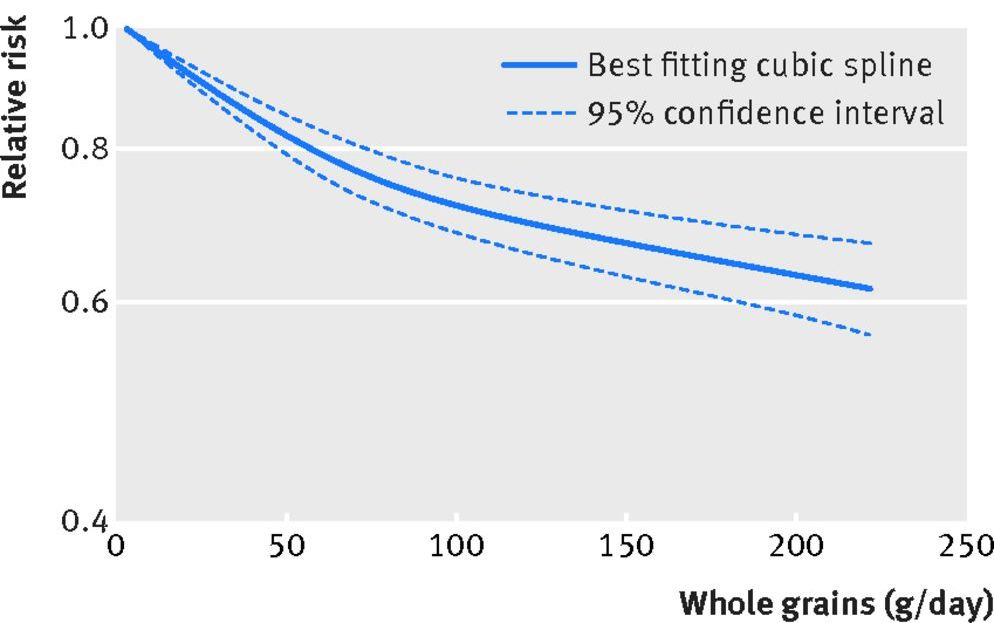Unveiling the Power of Whole Grain Foods: Path to Longevity
Between the gluten sensitivity, low-carb diets, and paleo, grains, in general, have fallen out of favor over the last decade or so. The original U.S. Department of Agriculture guidance published in 1992 made their foundation of the food pyramid, with 6-11 recommended servings per day. The more recent USDA guidance for MyPlate reduces the servings of grains and advises that half of them should be whole grains.
All-cause mortality studies make a much sharper division between whole grains and refined grains. Refined grains, like white bread, white rice, or refined pasta, are practically the baseline of the developed world diet. Eating more or less refined grains generally doesn't affect longevity, positively or negatively Food groups and risk of all-cause mortality: a systematic review and meta-analysis of prospective studies.1
The longevity benefits of whole grains, in comparison, look unlimited. Each serving (about 1 ounce or 30 grams dry) of whole-grain reduced all-cause mortality by about 8%, and the benefits of whole grains at least up to 8 servings, with little sign of decreasing benefit Whole grain consumption and risk of cardiovascular disease, cancer, and all-cause and cause-specific mortality: a systematic review and dose-response meta-analysis of prospective studies.2
When going through the details of the various types of food with whole grains, like dark bread, whole-grain breakfast cereals, and other grains (bulgar, kasha, and couscous, etc.), they all show a dose-related benefit. There doesn't seem to be any particular category that was better or worse than the others.
Eat over 100 grams (dry weight) of whole grains, and give your diet a solid foundation for longevity!
FAQs
Q: What are whole grain foods?
A: Whole grains are grains that contain the entire kernel, including the bran, germ, and endosperm. Examples include wheat, oats, brown rice, quinoa, and barley.
Q: What is the difference between whole grains and refined grains?
A: Whole grains retain all parts of the grain, providing more fiber, vitamins, and minerals. Refined grains have had the bran and germ removed, resulting in lower nutritional content.
Q: What are some common examples of whole grain foods?
A: Common whole grain foods include whole-wheat bread, oatmeal, brown rice, whole grain pasta, quinoa, and popcorn.
Q: Are whole grain foods gluten-free?
A: Some whole grains like rice and quinoa are gluten-free, but others like wheat, barley, and rye contain gluten. Gluten-free whole grain options include corn, rice, and certified gluten-free oats.
Q: How many whole grain foods should I consume daily?
A: It is recommended to aim for at least half of your grain intake to be whole grains, which is roughly equivalent to 5-8 servings (or about 80 to 100 grams) per day.
Q: What are the health benefits of eating whole grain foods?
A: Eating whole grains has been associated with a reduced risk of heart disease, stroke, type 2 diabetes, obesity, certain cancers, better digestive health, and weight management.
Q: Do whole grain foods help with weight management?
Whole grains are rich in fiber, promoting feelings of fullness and potentially aiding weight management by reducing excessive hunger and calorie intake.
Q: Are whole grain foods suitable for people with diabetes?
A: Whole grains have a lower glycemic index compared to refined grains, making them a better choice for managing blood sugar levels and providing sustained energy.
Q: Can whole grains lower the risk of heart disease?
A: Research suggests that consuming whole grains can lower the risk of heart disease due to their high fiber content, ability to improve cholesterol levels, and potential anti-inflammatory effects.
Q: How do whole grain foods contribute to digestive health?
A: The fiber content in whole grains supports regular bowel movements, prevents constipation, and promotes a healthy gut microbiome, contributing to overall digestive health.
Q: Are there any specific nutrients found in whole grain foods?
A: Whole grains provide essential nutrients like B vitamins, vitamin E, magnesium, selenium, and phytochemicals, which play crucial roles in various bodily functions and overall health.
Q: Can whole grains help reduce the risk of certain types of cancer?
A: Eating whole grain foods has been associated with a reduced risk of colorectal cancer and potentially other types of cancer due to their fiber content and protective antioxidants.
Q: How can I incorporate more whole grains into my diet?
A: Swap refined grains for whole grain alternatives, such as choosing whole wheat bread instead of white bread or opting for brown rice instead of white rice.
Q: Can whole grains be part of a low-carb or paleo diet?
Whole grain foods are generally not included in low-carb or paleo diets, as they tend to restrict carbohydrate intake. These diets emphasize consuming non-grain, low-carb, and unprocessed foods, focusing on lean proteins, healthy fats, and vegetables instead.



